Professor Bernard Quatermass is a fictional scientist, originally created by the writer Nigel Kneale for BBC Television. An intelligent and highly moral British scientist, Quatermass is a pioneer of the British space programme, heading the British Experimental Rocket Group. He continually finds himself confronting sinister alien forces that threaten to destroy humanity.

Mark Gatiss is an English actor, comedian, screenwriter, director, producer and novelist. His work includes writing for and acting in the television series Doctor Who, Sherlock, Game of Thrones and Dracula. Together with Reece Shearsmith, Steve Pemberton and Jeremy Dyson, he is a member of the comedy team The League of Gentlemen.

Thomas Nigel Kneale was a Manx screenwriter who wrote professionally for more than 50 years, was a winner of the Somerset Maugham Award, and was twice nominated for the BAFTA Award for Best British Screenplay.

Quatermass and the Pit is a British television science-fiction serial transmitted live by BBC Television in December 1958 and January 1959. It was the third and last of the BBC's Quatermass serials, although the chief character, Professor Bernard Quatermass, reappeared in a 1979 ITV production called Quatermass. Like its predecessors, Quatermass and the Pit was written by Nigel Kneale.

The Quatermass Experiment is a British science fiction serial broadcast by BBC Television during the summer of 1953 and re-staged by BBC Four in 2005. Set in the near future against the background of a British space programme, it tells the story of the first crewed flight into space, supervised by Professor Bernard Quatermass of the British Experimental Rocket Group.
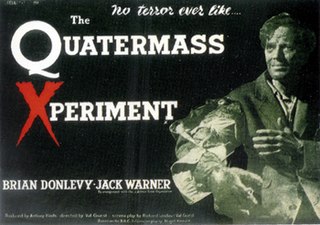
The Quatermass Xperiment is a 1955 British science fiction horror film from Hammer Film Productions, based on the 1953 BBC Television serial The Quatermass Experiment written by Nigel Kneale. The film was produced by Anthony Hinds, directed by Val Guest, and stars Brian Donlevy as the eponymous Professor Bernard Quatermass and Richard Wordsworth as the tormented Carroon. Jack Warner, David King-Wood, and Margia Dean appear in co-starring roles.

Quatermass II is a British science fiction serial, originally broadcast by BBC Television in the autumn of 1955. It is the second in the Quatermass series by writer Nigel Kneale, and the oldest of those serials to survive in its entirety in the BBC archives.
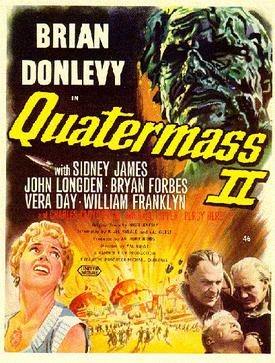
Quatermass 2 is a 1957 black-and-white British science fiction horror film drama from Hammer Film Productions. It was originally released in the UK as Quatermass II and was produced by Anthony Hinds, directed by Val Guest, and stars Brian Donlevy with co-stars John Longden, Sidney James, Bryan Forbes, Vera Day, and William Franklyn. Quatermass 2 is a sequel to Hammer's earlier film The Quatermass Xperiment (1955). Like its predecessor, it is based on the BBC Television serial Quatermass II written by Nigel Kneale. Brian Donlevy reprises his role as the eponymous Professor Bernard Quatermass, making him the only actor to play the character twice in a film. It is often erroneously considered as the first film sequel to use the '2' / 'II' suffix within the title, though this distinction belongs to Sanshiro Sugata Part II.

Quatermass and the Pit is a 1967 British science fiction horror film from Hammer Film Productions. It is a sequel to the earlier Hammer films The Quatermass Xperiment and Quatermass 2. Like its predecessors, it is based on a BBC Television serial, in this case Quatermass and the Pit, written by Nigel Kneale. It was directed by Roy Ward Baker and stars Andrew Keir in the title role as Professor Bernard Quatermass, replacing Brian Donlevy, who played the role in the two earlier films. James Donald, Barbara Shelley and Julian Glover appear in co-starring roles. The film opened in November 1967 to favourable reviews, and remains generally well regarded.
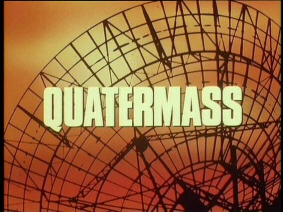
Quatermass is a 1979 British television science fiction serial. Produced by Euston Films for Thames Television, it was broadcast on the ITV network in October and November 1979. Like its three predecessors, Quatermass was written by Nigel Kneale. It is the fourth and final television serial to feature the character of Professor Bernard Quatermass who was played by John Mills.

The Quatermass Memoirs is a British radio drama-documentary, originally broadcast in 5 episodes on BBC Radio 3 in March 1996. Written by Nigel Kneale, it was born out of his Quatermass series of films and television serials, which had first been broadcast in the 1950s. The idea for the show appeared as BBC radio intended to create a season of programming looking back at the 1950s, and it was the final piece of writing Kneale completed relating to the character.

Nineteen Eighty-Four is a British television adaptation of the 1949 novel of the same name by George Orwell, originally broadcast on BBC Television in December 1954. The production proved to be hugely controversial, with questions asked in Parliament and many viewer complaints over its supposed subversive nature and horrific content. In a 2000 poll of industry experts conducted by the British Film Institute to determine the 100 Greatest British Television Programmes of the 20th century, Nineteen Eighty-Four was ranked in seventy-third position.

Rudolph Cartier was an Austrian television director, filmmaker, screenwriter and producer who worked predominantly in British television, exclusively for the BBC. He is best known for his 1950s collaborations with screenwriter Nigel Kneale, most notably the Quatermass serials and their 1954 adaptation of George Orwell's dystopian novel Nineteen Eighty-Four.
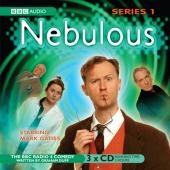
Nebulous is a post-apocalyptic science fiction comedy radio show written by Graham Duff and produced by Ted Dowd from Baby Cow Productions; it is directed by Nicholas Briggs. The series premiered in the United Kingdom on BBC Radio 4. Set in the year 2099 AD, the show focuses on the adventures of the eponymous Professor Nebulous, director of operations for the eco-troubleshooting team KENT (the Key Environmental Non-Judgmental Taskforce) as they combat various catastrophes and try to set the world back on the right path following a worldwide environmental disaster known as "The Withering". As well as being a parody of a number of famous science fiction programmes, including Doctor Who, Quatermass and Doomwatch, Nebulous is considered a cult radio programme, attracting a number of guest appearances from famous actors.
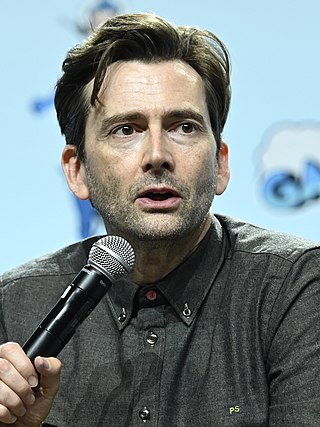
David John Tennant is a Scottish actor. He rose to fame for his role as the tenth incarnation of the Doctor in the BBC sci-fi series Doctor Who, returning to the show as the fourteenth incarnation of the character in 2022. His other notable roles include Giacomo Casanova in the BBC comedy-drama serial Casanova (2005), Barty Crouch Jr. in the fantasy film Harry Potter and the Goblet of Fire (2005), Peter Vincent in the horror remake Fright Night (2011), DI Alec Hardy in the ITV crime drama series Broadchurch (2013–2017), Kilgrave in the Netflix superhero series Jessica Jones (2015–2019), Crowley in the Amazon Prime fantasy series Good Omens (2019–present), Angus in The Loud House Movie (2021), and Phileas Fogg in Around the World in 80 Days (2021).

"The Year of the Sex Olympics" is a 1968 television play made by the BBC and first broadcast on BBC2 as part of Theatre 625. It stars Leonard Rossiter, Tony Vogel, Suzanne Neve and Brian Cox, and was directed by Michael Elliott. The writer was Nigel Kneale, best known as the creator of Quatermass.

The Stone Tape is a 1972 British television horror drama film written by Nigel Kneale and directed by Peter Sasdy and starring Michael Bryant, Jane Asher, Michael Bates and Iain Cuthbertson. It was broadcast on BBC Two as a Christmas ghost story in 1972. Combining aspects of science fiction and horror, the story concerns a team of scientists who move into their new research facility, a renovated Victorian mansion that has a reputation for being haunted. The team investigate the phenomenon, trying to determine if the stones of the building are acting as a recording medium for past events. However, their investigations serve only to unleash a darker, more malevolent force.

The Abominable Snowman is a 1957 British fantasy-horror film directed by Val Guest and written by Nigel Kneale, based on his own BBC television play The Creature. Produced by Hammer Films, the plot follows the exploits of British scientist Dr. John Rollason, who joins an American expedition, led by glory-seeker Tom Friend, to search the Himalayas for the legendary Yeti. Maureen Connell, Richard Wattis and Arnold Marle appear in supporting roles.
"The Lazarus Experiment" is the sixth episode of the third series of the revived British science fiction television series Doctor Who. It was broadcast on BBC One on 5 May 2007 and stars David Tennant as the Tenth Doctor and Freema Agyeman as Martha Jones.
British television science fiction refers to popular programmes in the genre that have been produced by both the BBC and Britain's largest commercial channel, ITV. BBC's Doctor Who is listed in the Guinness World Records as the longest-running science fiction television show in the world as well as the "most successful" science fiction series of all time.













